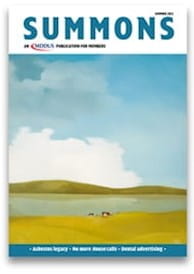DR GREGORY HOUSE MD: medical maverick, damaged diagnostic genius and a colleague without an ounce of collegiality, yet the man others longed to impress.
The flawed healer has made his final ward round. Of course, House doesn’t actually do ward rounds, preferring instead to watch pornography in his office, throw oversized tennis balls at his staff and steal food from the canteen.
Yet, House has caught the imagination of medics and patients alike around the world. I have heard him discussed at conferences, read papers in journals about him (conclusion: he’s not a great role model) and know that medical students hold ‘House parties’ where, rather than treading crisps and spilling beer into carpets, they gather to watch Hugh Laurie pretend to be an American doctor.
And, I admit it, I too have been seduced and remain fascinated by Greg House, and I will mourn his loss.
So why has this misanthropic doctor captivated millions of viewers? It isn’t the most realistic of medical dramas, particularly for a UK audience – the glamour of Princeton-Plainsboro hospital, and the role of diagnostician, are alien to anyone used to the NHS.
And the medicine of House is deliberately exotic. Medical students are taught that when they hear hooves, they should think horses not zebras, but House was all about the zebras (a piece of House trivia – its original working title was Chasing Zebras, Circling the Drain).
Who can forget the nun who appeared to have stigmata but turned out to be allergic to copper or the woman with maternal mirror syndrome or the man who wept blood? I could go on…
Intriguing as the symptoms and diagnoses on House may be, it is the universal questions that the programme asks that, for me, explain its appeal. At the heart of the series is Gregory House himself.
We know he is brilliant and we know he is an addict who self-medicates to control his own pain, the physical if not the existential kind. We know he brings unmatched clinical acumen and breath-taking rudeness to each encounter. House makes us laugh with each savage riposte and feel ashamed at laughing.
This is the trick of House: it exposes the complexity of motives in medicine and in life. It rejects the notion of doctor as altruistic and omniscient hero, but never the value of medicine. That House continues to strive, and that patients continue to come to him, is never in doubt.
The relationships in House are rarely easy and are often discomforting. In reality, House would have been struck off long ago. But the relationships that House has with his colleagues, students, patients, friends, family and lovers do feel authentic. They are messy and complex. These are interactions that are mediated as much by need, dependence and fear as by love, respect and friendship.
When characters are simultaneously drawn to and repelled by House, we understand. Anyone who has followed a consultant on a ward round, or sat in a hospital bed whilst the doctors speak about, but not to, you, will recognise the hierarchies and power play that are part of being on House’s team.
Above all, House is a programme that had the courage to show the essence of medicine. The science is represented as a quest in which first principles and deductive reasoning prevail. And the programme is brilliant at capturing the wonder and miracle of basic medical science, often with extraordinary images of cells going hay-wire, organs eroding and bodily fluid racing to where it doesn’t belong.
But House was equally attentive to the human aspects of medicine. It didn’t offer an idealised version of the therapeutic alliance (those are easy to find elsewhere on TV). No, House’s approach to the human dimension of medicine was fearless, unsettling, dark and demanding.
House’s constant refrain that ‘everyone lies’ was explored endlessly but never resolved. Time and time again, patients, colleagues and families who were quick to defend trust and truth were shown to be deceiving, denying or colluding. In House, it is the fallibility of people – doctors and their patients – that makes medicine much more than the sum of its scientific parts.
Medicine in House was uncertain, surprising and thought-provoking. It was part scientific quest and part study in human nature. It was original and unsettling. It wasn’t just that House reflected some aspects of medicine in an entertaining way. It was more fundamental than that: this programme explored the essence of life itself.
House never let its characters or viewers forget that, as well as the possibility that ‘everyone lies’, there is also the certainty that ‘everyone dies’. And yet still, Dr. Gregory House, his colleagues and his patients strived, every day, to live.
As do we all.
Deborah Bowman is Professor of Bioethics, Clinical Ethics and Medical Law at St George’s, University of London
Note: This column was first broadcast on Night Waves, BBC Radio 3, on Wednesday 23 May
This page was correct at the time of publication. Any guidance is intended as general guidance for members only. If you are a member and need specific advice relating to your own circumstances, please contact one of our advisers.
Read more from this issue of Insight

Save this article
Save this article to a list of favourite articles which members can access in their account.
Save to library